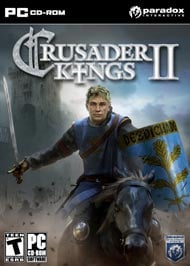Crusading For Glory
Crusader Kings II occupies an interesting place in Paradox Interactive’s catalog of strategy games. As you might have guessed by the title, it’s primarily intended as a successor to 2004’s Crusader Kings—a well-received title that put players in control of a European dynasty in the era of the Crusades. It’s also, however, a follow-up to last year’s Sengoku, which was set in Japan’s Warring States period.
While Crusader Kings II is a dramatic update of the original Crusader Kings—it covers the same time period, but includes many more features and upgraded graphics—it looks and feels like an expansion pack to Sengoku. The map, history, and cultural practices of Europe have been subbed in for those of Japan, but otherwise the game gives a sense of déjà vu. That’s not necessarily a bad thing, but it’s something to bear in mind if you already own Sengoku.
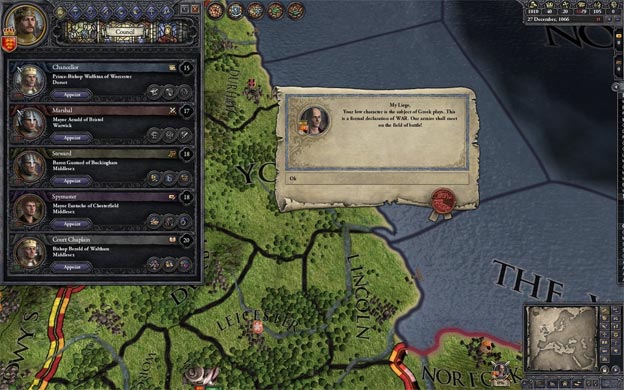
If you’re not familiar with the way Paradox has been making strategy games lately, here’s a quick primer. For each game, the developer meticulously researches a location and period of history—in this case, again, it’s medieval Europe—and models it. This means that many of the characters you’ll encounter are real historical figures; in fact, you can often click a link to read their biographies on Wikipedia. Various historical forces, from the power and motivations of various rulers to the influence of the Pope, are also present, though by playing well you can change history. And you can play as a wide variety of leaders, who face a wide variety of situations—you might be able to navigate your challenges easily, or you might have to work your way up from a tiny territory to bigger things. Since each game you play can be completely different than the last, the replay possibilities are endless.
And even beyond that, Paradox titles are no ordinary strategy games. The strategy genre typically focuses on war, with diplomacy as an afterthought or, at best, a secondary option. For Paradox, however, the entire point of your existence as a ruler is to manage your relationships by picking options from a menu—in a weird way, Crusader Kings II is almost more like The Sims than it’s like Total War or Civilization.
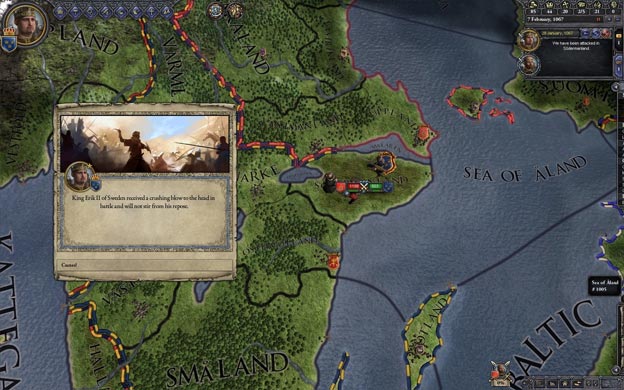
You need to choose the right people to handle your armies and administrative tasks. You need to deftly manage requests from other leaders. You need to keep the religious authorities happy—or else overthrow them. You have to decide how to handle dissent within your own territory. When important people become frustrated with you, you can try to appease them, or you can simply have them killed (with the risk that your involvement will be uncovered). You can also engage in various plots to undermine enemy nations. Most important, you need to make sure you marry and have children who can serve as your heirs—if your character dies and you have no heir, the game is over.
Even when you do go to war, you don’t just click on your army, click the enemy, and then watch your soldiers slaughter the bastards. No, if you’re going to fight another country in Crusader Kings II, you need a reason, or casus belli . The reason might be offered to you on a platter—maybe they’re occupying territory that rightfully belongs to you, or maybe they’re a Muslim or pagan nation that the Pope has targeted for a crusade. But otherwise, you’ll need to send a spy to the country to stir up trouble so you have an excuse to attack.
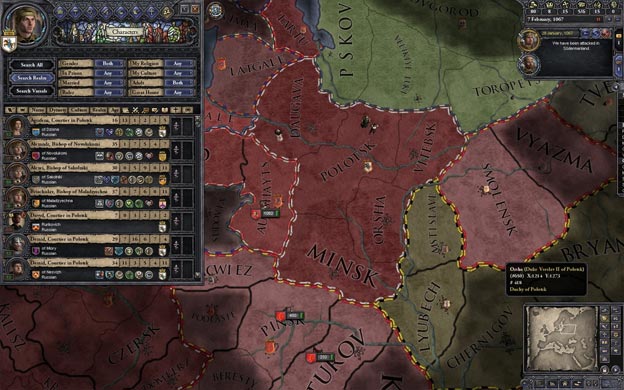
When war happens, it’s nothing special, though the developers have made some improvements since their previous games. You raise armies with various types of units and direct them to move around the map, as you do in any other strategy game. And, new to CKII, your armies are divided into three “flanks,” and you can assign them to use different tactics in battle—how your flanks match up to your opponents’ will help determine which side wins.
Further, unlike in many strategy games that run in real time, you won’t have to master the art of super-fast clicking to win battles; you can simply pause the game, enter as many commands as you like, and then unpause. Also, all fighting takes place on the world map. There’s no Total War-style switch to a more detailed view that would allow you to outwit the enemy on the battlefield.
If your response to all this is, “That sounds boring,” then just stop reading. Paradox has never tried to hide the fact that it makes games for a very narrow niche of players—heck, the tutorial alone will take you about 40 minutes, and even after that it will take hours before you feel anything like comfortable with the game. If you like some raw excitement with your strategy, you absolutely will not find it here.
This is all about poring over oodles of data about different countries and characters, and then trying to figure out how to get each moving part to behave the way you want it to. Games take a while to get interesting, even if you increase the speed of time, and it can take forever for a situation to resolve itself. By the time a game ends—in the 15th century if you live that long, or otherwise when you die with no heir—you will probably be sick of crusading for a while. And while I played the game before release and wasn’t able to test the multiplayer component, which features up to 32 players, the idea of playing through a round of CKII without being able to pause or adjust the speed of time does not appeal to me.
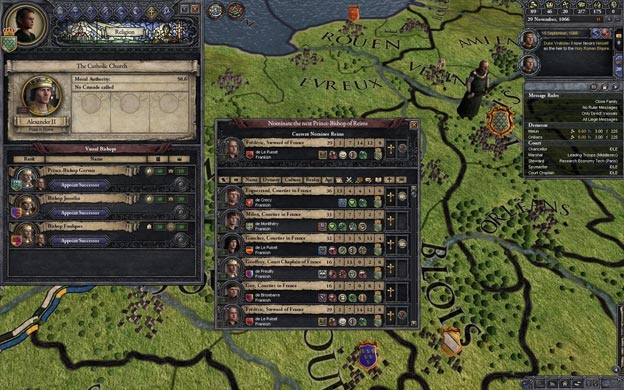
So, in the grand tradition of Paradox games, how does CKII fare? It’s a solid entry—the graphics are terrific (if overly similar to those of Sengoku), the music is epic, and, while I had to restart one section of the tutorial, the game itself played smoothly and auto-saved often. As difficult as it is to get the hang of CKII, the developers never abandon you—your advisers give you a steady stream of notices about things you need to do, and almost every time you bring up a menu, a hint screen appears to explain it to you.
Also, the attention to historical detail is truly astounding; if you take the time to explore this game, and to read the Wikipedia entries of the characters you find interesting, you will probably learn more about medieval Europe than you would in a college course on the subject. It’s this dedication to real history that makes Crusader Kings II and Sengoku distinct entities—even if the two games are practically identical in many ways, the different settings, cultures, and characters make you feel like you’re living in a different world. This is reflected in the end goals as well: In Sengoku you sought to become Shogun, but in CKII you simply try to acquire as much “Prestige” as possible by commanding the respect of others.
The bottom line is that Paradox Interactive knows its audience, and the developer hand-crafted Crusader Kings II to fit the needs of its dedicated fan base. This is not an accessible game, and it does not pretend to be. If you want an update to the original Crusader Kings, or if you want to play Sengoku in the context of a different culture, Crusader Kings II is a must-buy. If not, stay away.
RATING OUT OF 5 RATING DESCRIPTION 4.2 Graphics
The game looks good, but the graphics are very similar to Sengoku’s. 4.4 Control
It’s just pointing and clicking, though the menu system is complicated. 4.0 Music / Sound FX / Voice Acting
The tunes are epic. 4.3 Play Value
This is not for everyone, but Paradox fans will eat it right up. 4.3 Overall Rating – Great
Not an average. See Rating legend below for a final score breakdown.
| Review Rating Legend | |||
|---|---|---|---|
| 0.1 – 1.9 = Avoid | 2.5 – 2.9 = Average | 3.5 – 3.9 = Good | 4.5 – 4.9 = Must Buy |
| 2.0 – 2.4 = Poor | 3.0 – 3.4 = Fair | 4.0 – 4.4 = Great | 5.0 = The Best |
Game Features:
